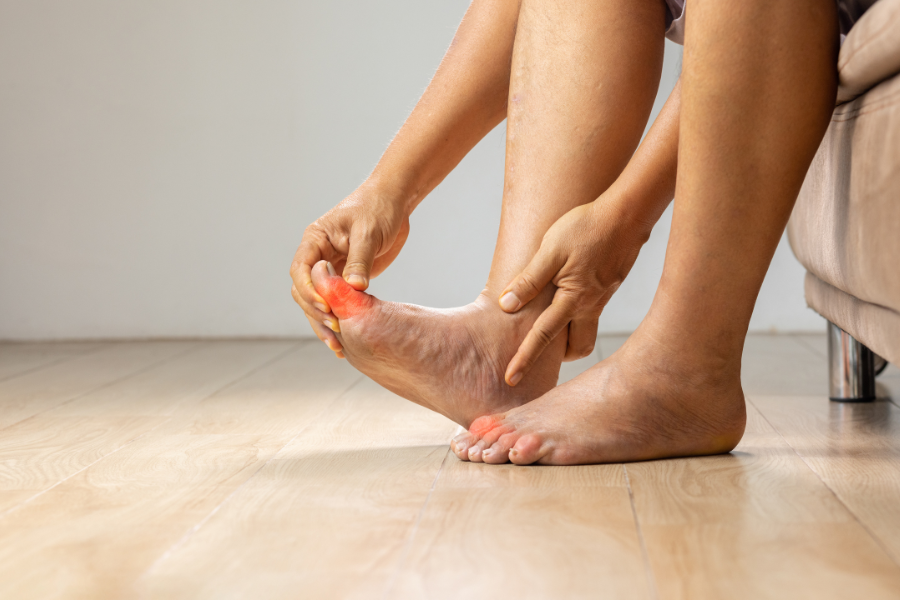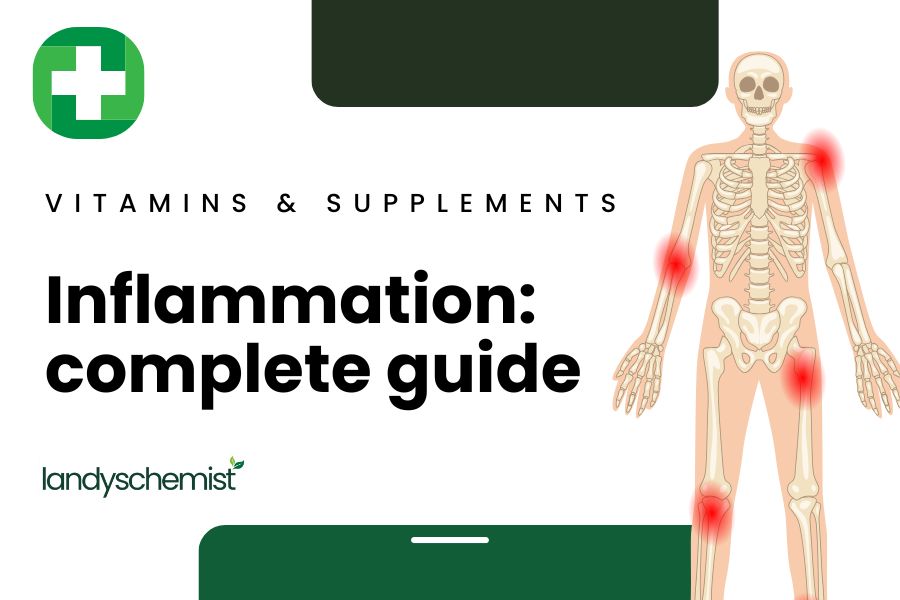
Gout symptoms, prevention and treatment
What is Gout?
Gout is a painful kind of arthritis that occurs when crystals form around and inside the joints, causing severe pain, discolouration beneath the skin and swelling. It affects between 1-2 people in every hundred in the UK, and is more common in men than women. Gout can be very uncomfortable, debilitating and painful, but there are treatments and remedies available to alleviate symptoms.
Signs and symptoms of gout include severe joint pain, swelling around the joints, and skin that is hot to the touch and red in colour around the affected area. Symptoms can flare up quickly, even in a few hours, and then disappear in around 3-10 days. After this, the joint should typically return to normal and symptoms should pass. Any joint in the body can be affected by gout, but the condition occurs most often in the ankles, toes, knees and fingers.
If gout is left untreated, it can cause further health complications including tophi (where uric acid crystals develop beneath the skin), kidney stones and joint damage. If gout develops in the knees, pseudogout can occur, which is a similar condition to gout, affecting the knee joints. It causes pain, stiffness and swelling in the joints. Pseudogout is also known as calcium pyrophosphate deposition (CPPD), and the crystals that form in the body as a result of the condition are calcium phosphate crystals.
Gout is one of the most common types of arthritis. When 'attacks' of gout occur, they can cause great amounts of joint pain, which can then spread to other joints in the body. Gout tends to affect men over the age of 40, and post-menopausal women when they have lower oestrogen levels in their body.
When should I see my GP for gout?
If you have the above symptoms and you suspect that you may have gout that hasn't been previously diagnosed, you should speak to your doctor. This is especially if you're experiencing chronic pain and fever-like symptoms, such as a high temperature. It's important to confirm a diagnosis as soon as possible, because inflamed joints can lead to more severe health problems and other conditions if not treated promptly. If you have been diagnosed with gout, your GP should have prescribed you medications. If these have had no effect after a couple of days, consult your doctor.
Getting a diagnosis for gout:
Your GP will examine your medical history, undertake a physical exam and undertake tests to determine if you have gout. This will be because they will need to assess and rule out whether your inflammation and joint pain is down to another cause, such as another type of arthritis or injury. You may have to undertake tests including joint fluid analysis, where liquid is drawn from the joint to test for uric acid crystals. You may also be asked to have blood tests to see if uric crystals and high uric acid levels are present. Other tests that may be necessary include X-rays, ultrasounds and magnetic resonance imaging may also be required.
What causes gout?
Gout occurs when there is a build up of uric acid in the blood, which causes crystals to form. The build up of uric acid can occur when the body produces too much, or if the kidneys don't filter enough out of the body effectively. This causes joints to become red, swollen and painful. You have more likelihood of developing gout if you have a relative with gout, if you have kidney issues, or if you eat foods that can cause a build-up of uric acid, such as offal, seafood and red meat. Those with obesity, high blood pressure and diabetes are also at higher risk.
You are more likely to develop gout if any of the following applies:
– You eat a lot of purine-rich foods such as scallops, tuna, sardines and red meat
– You consume drinks with a high fructose content, or drink excessive amounts of beer and alcohol
– You are overweight or obese
– You have gout in your family's medical history
– You have chronic health conditions like kidney disease, heart disease or obesity in your family
– You have a microbiome imbalance (this can be responsible for inflammatory conditions like arthritis)
What are the available treatments for gout?
There are various treatments available for gout. These include:
- Ice packs
- Non-steroidal anti-inflammatory drugs (prescribed by a GP)
- Colchicine or corticosteroids
- Lifestyle and treatment plans, including dietary changes and weight loss
- Medication to lower uric acid levels in the blood – this can dissolve the crystals as they form in the blood. (This is a long-term treatment to prevent gout from returning).
Treatment for gout focuses on lowering levels of uric acid in the body to prevent future attacks. Xanthine oxidase inhibitors and probenecid help to reduce uric acid in the blood, so attacks are less frequent and painful. Monitoring the diet carefully, doing regular exercise and maintaining a healthy weight are some ways to reduce uric acid levels in the body. Some changes that can be made to the diet include eating less meat and fish, reducing sugar intake, drinking more water and consuming less alcohol. Arthritis sufferers can also avoid gluten and dairy foods to reduce their chances of gout.
Alternative remedies for gout:
You an also try herbal remedies and alternative methods to reduce pain from gout and to lower uric acid levels in the body. As with all herbal remedies, what works for one person may not work for everyone else. Before trying any herbal remedies, you should first check with your GP to see that they are suitable to take. Common foods and natural remedies for gout include:
- Drinking coffee
- Eating berries or taking berry-based supplements
- Taking Vitamin C supplements (which is connected to lowering uric acid levels)
- Supplements such as devil’s claw, bromelain and turmeric
- HealthAid Uriprinol Tablets (to help maintain normal levels of uric acid). These supplements contain a range of vitamins and natural extracts that can help the body to achieve healthy levels of uric acid in the blood stream. They can also be taken for pain and inflammation
- Acupuncture (a type of Chinese medicine involving the placement of very thin needles at certain points on the body). It is a very effective practice at treating pain
- Using hot and cold compresses (to reduce swelling)
Gout, stigma and mental health
There is still a social stigma surrounding gout. Those who have the condition have been known to feel a sense of shame and embarrassment, which can prevent them from seeking the treatment they really need. Leaving gout untreated can also increase the risk of other conditions such as kidney stones and heart disease. There is a still a stigma surrounding gout because of its historial links to King Henry VIII and his overindulgent lifestyle, causing gout to be named 'the disease of kings'. In this way, gout has been linked to tasteless jokes and social stigma, which can cause more stress for an individual suffering with the condition. Those with gout have greater risk of depression if they do not feel comfortable talking about their condition and have multiple or frequent attacks. Frequent exercise, a healthy diet and good quality sleep can help if you are struggling with your mental health as a result of gout. You should also reach out for advice and support if you need it, especially from friends and family. You can also get help via the UK Gout Society and Versus Arthritis.
By Panasha Desai, Pharmacist





